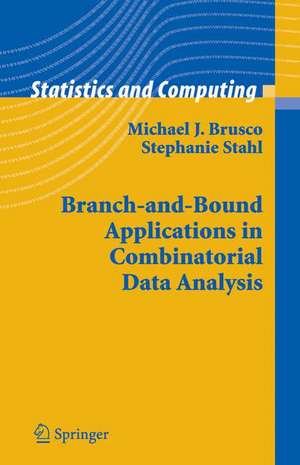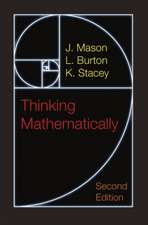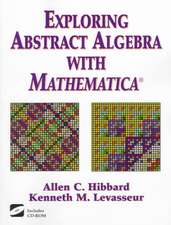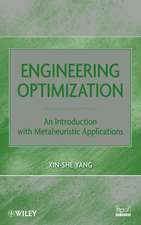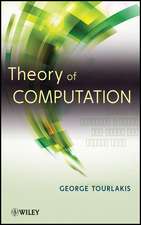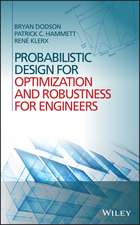Branch-and-Bound Applications in Combinatorial Data Analysis: Statistics and Computing
Autor Michael J. Brusco, Stephanie Stahlen Limba Engleză Hardback – 22 iul 2005
| Toate formatele și edițiile | Preț | Express |
|---|---|---|
| Paperback (1) | 693.90 lei 6-8 săpt. | |
| Springer – dec 2010 | 693.90 lei 6-8 săpt. | |
| Hardback (1) | 698.47 lei 6-8 săpt. | |
| Springer – 22 iul 2005 | 698.47 lei 6-8 săpt. |
Din seria Statistics and Computing
-
 Preț: 228.21 lei
Preț: 228.21 lei -
 Preț: 438.82 lei
Preț: 438.82 lei -
 Preț: 386.81 lei
Preț: 386.81 lei - 20%
 Preț: 753.97 lei
Preț: 753.97 lei - 20%
 Preț: 1059.77 lei
Preț: 1059.77 lei -
 Preț: 426.72 lei
Preț: 426.72 lei - 20%
 Preț: 474.37 lei
Preț: 474.37 lei - 18%
 Preț: 1387.07 lei
Preț: 1387.07 lei -
 Preț: 433.53 lei
Preț: 433.53 lei -
 Preț: 208.58 lei
Preț: 208.58 lei - 20%
 Preț: 1454.73 lei
Preț: 1454.73 lei -
 Preț: 377.18 lei
Preț: 377.18 lei - 23%
 Preț: 652.30 lei
Preț: 652.30 lei - 20%
 Preț: 1174.26 lei
Preț: 1174.26 lei - 20%
 Preț: 505.19 lei
Preț: 505.19 lei - 18%
 Preț: 959.32 lei
Preț: 959.32 lei - 15%
 Preț: 643.48 lei
Preț: 643.48 lei -
 Preț: 392.75 lei
Preț: 392.75 lei - 15%
 Preț: 640.06 lei
Preț: 640.06 lei -
 Preț: 404.29 lei
Preț: 404.29 lei - 15%
 Preț: 710.42 lei
Preț: 710.42 lei - 15%
 Preț: 695.85 lei
Preț: 695.85 lei - 20%
 Preț: 1276.86 lei
Preț: 1276.86 lei - 18%
 Preț: 1003.38 lei
Preț: 1003.38 lei - 15%
 Preț: 703.85 lei
Preț: 703.85 lei -
 Preț: 384.70 lei
Preț: 384.70 lei - 15%
 Preț: 606.17 lei
Preț: 606.17 lei - 15%
 Preț: 646.94 lei
Preț: 646.94 lei - 15%
 Preț: 589.02 lei
Preț: 589.02 lei - 18%
 Preț: 1117.99 lei
Preț: 1117.99 lei -
 Preț: 503.52 lei
Preț: 503.52 lei - 18%
 Preț: 735.38 lei
Preț: 735.38 lei - 15%
 Preț: 693.90 lei
Preț: 693.90 lei
Preț: 698.47 lei
Preț vechi: 821.73 lei
-15% Nou
Puncte Express: 1048
Preț estimativ în valută:
133.65€ • 139.92$ • 110.59£
133.65€ • 139.92$ • 110.59£
Carte tipărită la comandă
Livrare economică 05-19 aprilie
Preluare comenzi: 021 569.72.76
Specificații
ISBN-13: 9780387250373
ISBN-10: 0387250379
Pagini: 221
Ilustrații: XII, 222 p.
Dimensiuni: 155 x 235 x 16 mm
Greutate: 0.46 kg
Ediția:2005
Editura: Springer
Colecția Springer
Seria Statistics and Computing
Locul publicării:New York, NY, United States
ISBN-10: 0387250379
Pagini: 221
Ilustrații: XII, 222 p.
Dimensiuni: 155 x 235 x 16 mm
Greutate: 0.46 kg
Ediția:2005
Editura: Springer
Colecția Springer
Seria Statistics and Computing
Locul publicării:New York, NY, United States
Public țintă
ResearchCuprins
Cluster Analysis—Partitioning.- An Introduction to Branch-and-Bound Methods for Partitioning.- Minimum-Diameter Partitioning.- Minimum Within-Cluster Sums of Dissimilarities Partitioning.- Minimum Within-Cluster Sums of Squares Partitioning.- Multiobjective Partitioning.- Seriation.- to the Branch-and-Bound Paradigm for Seriation.- Seriation—Maximization of a Dominance Index.- Seriation—Maximization of Gradient Indices.- Seriation—Unidimensional Scaling.- Seriation—Multiobjective Seriation.- Variable Selection.- to Branch-and-Bound Methods for Variable Selection.- Variable Selection for Cluster Analysis.- Variable Selection for Regression Analysis.
Recenzii
From the reviews:
"To say it unadorned at the outset, this excellent mongraph by Brusco and Stahl on applications of branch-and-bound algorithms in combinatorial data anlaysis fills a long neglected gap in the quantitative psychology literature, and will prove an indispensable companion to any researcher having serious interest in advanced techniques for seriation/scaling and nonhierarchical clustering." Psychometrika
"This monograph is true to its purpose: developing and carefully explaining the application of branch-and-bound (B&B) algorithms for the solution of specific combinatorial optimization problems in statistics. … One of the bright features of this book is the even handed way in which the B&B methods are presented. In each case, the authors clearly spell out not only the process but also its strengths and limitations. … Brusco and Stahl do a nice job … ." (Jon R. Kettenring, SIAM Review, Vol. 48 (2), 2006)
"This book both summarizes and illustrates the methods that are currently available for applying branch-and-bound methods to certain data analysis situations. … The mathematical basis is clearly explained, pseudo-code for the algorithms is given where needed, very simple cases are used to demonstrate the methodology, and larger examples are also presented. … Care is taken to discuss the limitations as well as the advantages of the branch-and-bound approach." (C.D. Kemp, Short Book Reviews, Vol. 26 (1), 2006)
"This book … is the first attempt to use this technique, branch and bound, to solve discrete optimization problems that arise in statistical data analysis. The authors are one of the pioneers in this area and authored a series of papers in relevant leading journals. This book is … written in a more lucid language, and includes a good number of examples, illustrations and case studies. … This book is going to be extremely useful to the researchers or practitioners of combinatorialdata analysis." (Bimal Roy, Sankhya: The Indian Journal of Statistics, Vol. 68 (1), 2006)
"It is the aim of this monograph to summarise and illustrate available methods for applying the branch-and-bound process to problems of combinatorial data analysis. … The book is well suited to all students and researchers interested in the implementation of branch-and-bound procedures for the statistical analysis of data." (Christina Diakaki, Zentralblatt MATH, Vol. 1093 (19), 2006)
"The aim of this book is to build a bridge between operations research (discrete optimization) and statistics. … Overall, the book is well structured and easily readable and a good introduction to the field of Branch and Bound algorithms as a possible solution to selected problems in statistics." (Gero Szepannek, Statistical Papers, Vol. 48, 2007)
"Michael Brusco and Stephanie Stahl suggest solving combinatorial data analysis problems by using the branch-and-bound technique to optimize the objective functions that measure goodness of grouping or sequencing. … Brusco and Stahl’s book is valuable for students and researchers interested in optimization or data analysis. … They provide mathematical descriptions of objective functions and bounds, pseudocodes, step-by-step illustrations, software programs, and their results for several problems." (Julius Zilinskas, Interfaces, Vol. 37 (1), 2007)
"To say it unadorned at the outset, this excellent mongraph by Brusco and Stahl on applications of branch-and-bound algorithms in combinatorial data anlaysis fills a long neglected gap in the quantitative psychology literature, and will prove an indispensable companion to any researcher having serious interest in advanced techniques for seriation/scaling and nonhierarchical clustering." Psychometrika
"This monograph is true to its purpose: developing and carefully explaining the application of branch-and-bound (B&B) algorithms for the solution of specific combinatorial optimization problems in statistics. … One of the bright features of this book is the even handed way in which the B&B methods are presented. In each case, the authors clearly spell out not only the process but also its strengths and limitations. … Brusco and Stahl do a nice job … ." (Jon R. Kettenring, SIAM Review, Vol. 48 (2), 2006)
"This book both summarizes and illustrates the methods that are currently available for applying branch-and-bound methods to certain data analysis situations. … The mathematical basis is clearly explained, pseudo-code for the algorithms is given where needed, very simple cases are used to demonstrate the methodology, and larger examples are also presented. … Care is taken to discuss the limitations as well as the advantages of the branch-and-bound approach." (C.D. Kemp, Short Book Reviews, Vol. 26 (1), 2006)
"This book … is the first attempt to use this technique, branch and bound, to solve discrete optimization problems that arise in statistical data analysis. The authors are one of the pioneers in this area and authored a series of papers in relevant leading journals. This book is … written in a more lucid language, and includes a good number of examples, illustrations and case studies. … This book is going to be extremely useful to the researchers or practitioners of combinatorialdata analysis." (Bimal Roy, Sankhya: The Indian Journal of Statistics, Vol. 68 (1), 2006)
"It is the aim of this monograph to summarise and illustrate available methods for applying the branch-and-bound process to problems of combinatorial data analysis. … The book is well suited to all students and researchers interested in the implementation of branch-and-bound procedures for the statistical analysis of data." (Christina Diakaki, Zentralblatt MATH, Vol. 1093 (19), 2006)
"The aim of this book is to build a bridge between operations research (discrete optimization) and statistics. … Overall, the book is well structured and easily readable and a good introduction to the field of Branch and Bound algorithms as a possible solution to selected problems in statistics." (Gero Szepannek, Statistical Papers, Vol. 48, 2007)
"Michael Brusco and Stephanie Stahl suggest solving combinatorial data analysis problems by using the branch-and-bound technique to optimize the objective functions that measure goodness of grouping or sequencing. … Brusco and Stahl’s book is valuable for students and researchers interested in optimization or data analysis. … They provide mathematical descriptions of objective functions and bounds, pseudocodes, step-by-step illustrations, software programs, and their results for several problems." (Julius Zilinskas, Interfaces, Vol. 37 (1), 2007)
Textul de pe ultima copertă
There are a variety of combinatorial optimization problems that are relevant to the examination of statistical data. Combinatorial problems arise in the clustering of a collection of objects, the seriation (sequencing or ordering) of objects, and the selection of variables for subsequent multivariate statistical analysis such as regression. The options for choosing a solution strategy in combinatorial data analysis can be overwhelming. Because some problems are too large or intractable for an optimal solution strategy, many researchers develop an over-reliance on heuristic methods to solve all combinatorial problems. However, with increasingly accessible computer power and ever-improving methodologies, optimal solution strategies have gained popularity for their ability to reduce unnecessary uncertainty. In this monograph, optimality is attained for nontrivially sized problems via the branch-and-bound paradigm.
For many combinatorial problems, branch-and-bound approaches have been proposed and/or developed. However, until now, there has not been a single resource in statistical data analysis to summarize and illustrate available methods for applying the branch-and-bound process. This monograph provides clear explanatory text, illustrative mathematics and algorithms, demonstrations of the iterative process, psuedocode, and well-developed examples for applications of the branch-and-bound paradigm to important problems in combinatorial data analysis. Supplementary material, such as computer programs, are provided on the world wide web.
Dr. Brusco is a Professor of Marketing and Operations Research at Florida State University, an editorial board member for the Journal of Classification, and a member of the Board of Directors for the Classification Society of North America. Stephanie Stahl is an author and researcher with years of experience in writing, editing, and quantitative psychology research.
For many combinatorial problems, branch-and-bound approaches have been proposed and/or developed. However, until now, there has not been a single resource in statistical data analysis to summarize and illustrate available methods for applying the branch-and-bound process. This monograph provides clear explanatory text, illustrative mathematics and algorithms, demonstrations of the iterative process, psuedocode, and well-developed examples for applications of the branch-and-bound paradigm to important problems in combinatorial data analysis. Supplementary material, such as computer programs, are provided on the world wide web.
Dr. Brusco is a Professor of Marketing and Operations Research at Florida State University, an editorial board member for the Journal of Classification, and a member of the Board of Directors for the Classification Society of North America. Stephanie Stahl is an author and researcher with years of experience in writing, editing, and quantitative psychology research.
Caracteristici
Provides explanatory text, illustrative mathematics and algorithms, demonstrations of the iterative process, pseudocode, and well-developed examples for (familiar as well as novel) applications of the branch-and-bound paradigm to relevant problems in combinatorial data analysis
